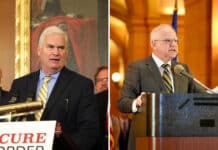SAINT PAUL, Minn — Members of the Minnesota Senate spent part of their Monday morning voting on the Real ID bill.
The Senate voted 38-29 in opposition to the bill. Senate President Michelle Fischbach (R-Paynesville) had to quiet the gallery as applause broke out.
Republicans tried to pass Real ID as quickly as possible. “I don’t want the federal government to tell us what to do,” said Senate Majority Leader Paul Gazelka (R-Nisswa) just before the vote. Gazelka voted against Real ID previously, but said he would vote for it if he was asking others to vote for it also.
In late February, the Minnesota House passed their version of Real ID. The concept of Real ID has found controversy within both political parties.
Democrats have raised issue with one particular line in the Real ID bill. Line 6.25 in the House version and Section 10 of the Senate version would ban undocumented immigrants from obtaining a driver’s license.
Governor Mark Dayton has called for lawmakers to reconsider the clause found in the House and Senate version of Real ID. “If they want this window of opportunity, they are going to need to create it,” Dayton told the Pioneer Press last week.
“The language [in the bill] will further divide the State. It’s borderline offensive…We need to be as inclusive as possible,” Sen. Melisa Franzen (D-Edina) told the chamber ahead of the vote.
Republicans have found issue with the law itself. Many conservative activists believe the bill is a violation of the 10th Amendment. Many activists are also concerned with the additional control given to the federal government. Real ID would house the personal data of every Real ID holder on a server in Virginia, accessible to all government authorities.
Sen. Bruce Anderson (R-Buffalo) told the chamber, “this is in response to 9/11. Will Real ID stop terrorist attacks? I think not.” Anderson, who disappeared during a Real ID Committee vote compared the Senate to prostitutes looking for money stating, “50 states are subject to the pimping of the federal government.”c
On a national level, 116 lawmakers in Pennsylvania have asked President Donald Trump to put an end to Real ID. Pennsylvania legislators asked Trump to “to work with the states and the U.S. Congress to resolve the constitutional issues that this law has raised and relieve the states of the massive cost that this law has burdened taxpayers with throughout our nation.”
Minnesota Congressmen Jason Lewis (R-MN-02) and Tom Emmer (R-MN-06) became a cosponsor of Rep. Mark Sanford’s (R-SC-01) Real ID Privacy Protection Act. The bill would “amend the REAL ID Act of 2005 to remove the provision requiring each State to provide all other States with electronic access to information contained in the motor vehicle database of the State, and for other purposes.”
The loss of Real ID could prove difficult for many Minnesotans. Real ID is required by the government to board commercial airlines, gain access to military bases, federal buildings, and nuclear facility sites.











